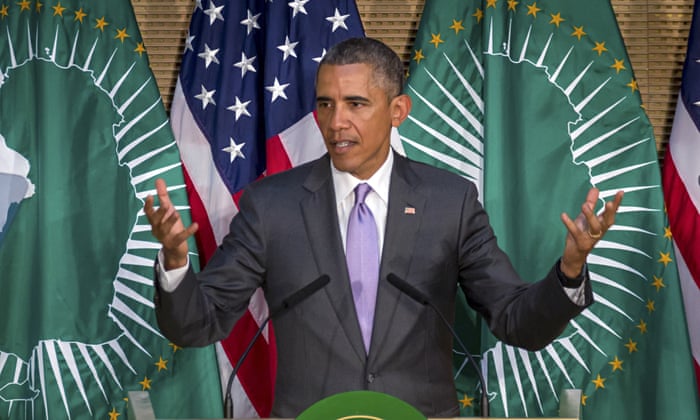These ‘big men’ argue that human rights is a western concept, writes an award-winning east African journalist

Even before the dust could settle on President Barack Obama’s candid criticism of African presidents who manipulate their constitutions so that they can stay longer in power, Uganda’s president, Yoweri Museveni – once the west’s model of a truly democratic leader – was on his way again to contest the presidential seat he has held for 30 years. From Rwanda to the Democratic Republic of Congo, Burundi to Zimbabwe, Africa’s big men replied to Obama: this oppression – the shackles, the poverty and indignity – are what the African people have chosen. Tedros Adhanom, the foreign minister of Ethiopia, home of the African Union, defended African leaders who cling to power, saying: “Because they made the law, they can change the law.”
Museveni was echoing the actions of Pierre Nkurunziza of Burundi, Paul Kagame of Rwanda, Robert Mugabe of Zimbabwe and indeed all African leaders who have sought to manipulate the law for a chance at eternal presidency. Adhanom proposed that the extension of term limits was acceptable if it had popular support. It is this type of apologist politics that has kept Africa in its current state – a continent of people who accept lacklustre leaders in the belief that there is a miraculous star shining somewhere at the end of the tunnel of bad leadership. It is this desperate need to cling to power, for no apparent reason and to no end, that Obama does not understand.
This lack of understanding of how things work in Africa, Africa’s big men are quick to point out, is a result of their son, Obama, being overly indoctrinated in the ways of the west. To the advocates of Africa’s new and emerging autocrats such as Andrew Mwenda, a former opposition-leaning journalist turned informal PR for the governments of Uganda and Rwanda, Obama is a puppet whose African ancestry is being used by the US to further its agenda of exploitation. And, Mwenda argues in an opinion article for Al Jazeera, Africa should not listen to anything Obama says.
To African leaders, Obama’s solutions for Africa are untenable. They view him as detached from the challenges and realities of an African leader. For starters, this African son has one wife and no known concubines. No wonder he comes up with wayward ideas such as educating more African women. Does he know how hard it would be to convince a scientist, engineer or entrepreneur to become a second wife? Does he know how many legal cases African countries would have to deal with if most of the masses – whose human-rights violations nosy organisations such as Human Rights Watch and Amnesty International do not tire of reporting – were educated and employed rather than hungry and destitute?
The reality is that these African leaders do not realise that their argument that human rights, dignity and democracy are a western concept force-fed to the African continent no longer holds water. Its demise happened around the time when Bakayoko, the protagonist in Senegalese writer Ousmane Sembène’s God’s Bits of Wood, declared that dignity, good food, water and housing, are not for white people – they are for people. The notion that human rights and democracy – the kind that Obama speaks about – are not African was stripped of all legitimacy when African leaders, evoking the universal declaration of human rights and drawing inspiration from the French and American revolutions, demanded self governance and equality. They made these demands in English, French, Portuguese and other languages that their tyrants would understand. With their sweat and blood, they adopted human rights, made them African and used these ideals to liberate the continent from colonialism. It is baffling that these same people now dare to reject such ideals as being foreign. With worrying nostalgia, some Africans of an older generation will tell you that colonialism was so much better than the governments they live under. If African leaders cared, it is this kind of talk that would keep them up at night and push them to do whatever it takes to perform better.
And yet, like it or not, Obama’s presence in the hall will be haunting and taunting the delegates. His message will not be exorcised. And even as they publicly act nonchalant about it, they will go home and think of the potent words of the first African-American US president. At the next AU meeting, there will be some countries that are still the marvel of the continent and a sting on the consciences of the power–clingers. Kenya, Tanzania, Nigeria, Senegal, Botswana, Ghana and others that strive to respect that basic facet of democracy called “term limits” will be a reminder that perhaps the continent is not doomed after all.
By the time the children who were born during Obama’s Africa visit will be crawling, the reality of a continent that is rising but not rising will have set in. With it will also come the realisation that a good guest is not one who brings food so that you can feast together for days and grow fatter. A good guest is one who brings you a hoe so that you can dig and have food for the rest of your life.
Obama may be blamed for not making grandiose announcements about increased aid during his visit, but his powerful words are the kind of inspirational tool we Africans – both young and old – need to lift our downtrodden and intimidated souls and reminds us that even our grandfathers can and should be challenged when they err.
No comments:
Post a Comment